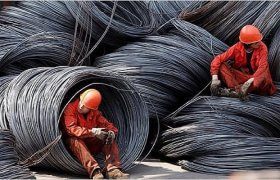China’s economic structure has changed significantly in recent months. China’s industrial growth does not seem to have gone as far as politicians thought. The rapid growth of China’s energy-producing industries has created the conditions for electricity shortages in the country and the government restricting these industries. This creates the conditions for a decline in metal production and, of course, a decline in the consumption of raw materials. The energy crisis in East Asia by the end of 2021 seems to be a major challenge. In the following, we will evaluate the latest situation related to this news. Please be with Artan Press.
*** Stock market and commodities under the shadow of China energy crisis
Stock markets and commodity markets reacted yesterday to the energy crisis in East Asia. The rapid growth of China’s energy-producing industries has paved the way for government shortages of electricity and restrictions on those industries. China’s energy crisis has created conditions for commodity and steel markets. The stock market reacted to this yesterday. Dalian coal price index fell 7% and shares of the country’s coal companies sometimes fell as much as 10%. The decline continued to reflect a drop in demand due to a drop in electricity consumption in the country.
*** Impact of falling coal prices on falling steel prices
Falling coal prices in China Due to falling iron ore prices could make steel cheaper than before. This fall in steel prices in the global market can be a good excuse to reduce steel prices in the domestic market. Unfortunately, in the Iranian steel market, pricing is based on the dollar. Given that the dollar exchange rate is still high, no agreement can be reached on the steel exchange rate formula. If export rates fall, it will be practically a subsidy for the destination country. Therefore, the situation of the Iranian steel market has become somewhat complicated according to the parameters available in the market.
*** High risk of energy crisis in Asian countries
Some energy analysts believe that the Asian continent, especially China and India, will face serious challenges due to the unprecedented energy crisis. The continent of Europe is facing an unprecedented and serious energy shortage crisis on the eve of autumn. Analysts have warned of serious and devastating consequences. This crisis may be spreading and will soon spread to Asian countries.
The world’s largest buyer of gas and coal may be the next continent to be hit by the crisis, as China, the world’s second-largest economy, will be very vulnerable to the crisis. We have previously warned about the weakness of China’s energy supply. For this crisis, China seems to be taking a contractionary path in steel production policy. Steel markets are likely to stagnate in the second half of the year.
*** Rising coal prices and bankruptcy of Chinese companies
As the world’s second-largest economy has revived since the outbreak of the Corona virus, energy demand has risen sharply, leading to rising fuel prices and Beijing’s unprecedented decisions on some of the country’s energy security issues. It happens that China’s economy is slowing down and inflation is rising. The country’s producer price index reached its highest level in 13 years last month due to rising commodity prices. The government has warned that high costs for raw materials such as electricity and petrochemicals are exacerbating the challenges of growth and employment for producers, especially small and medium-sized businesses. China’s power industry is in a difficult situation.
*** China’s energy crisis and the possibility of rising oil prices
It was because of these concerns that Beijing decided in a historic move to extract oil from its strategic reserves. China, the world’s largest oil importer and second largest consumer of oil, relies heavily on foreign oil to keep its economy afloat. Correcting this vulnerability has long put energy security at the heart of China’s energy policy, but Beijing seems to be focusing on harm control right now. It seems that cheap Iranian oil can save the Chinese economy from this predicament.
*** China’s energy crisis in the oil and electricity sector
The energy crisis in China is not limited to fossil fuels. Due to the low level of technology of some Chinese power plants, we will see a decline in production in this area. In fact, due to the sharp increase in demand for electricity, some Chinese provinces are facing the worst electricity shortages in the country in a decade. What has exacerbated the situation is rising coal prices, which have put Chinese power companies at real risk of bankruptcy. Coal accounts for more than 50 percent of China’s energy basket, and a recent dispute with Australia limited coal supplies to China before prices rose.
*** Bankruptcy of energy companies in China
Last month, 11 coal-fired power companies in the Beijing-Tianjin-Tangshan power grid reported losses and are on the verge of bankruptcy due to rising coal prices. It is unclear how long Beijing will stand to prevent the crisis. There is widespread speculation that the Chinese government will soon be forced to end its informal boycott of coal imports from Australia in order to meet current demand. Although the Chinese president has made great promises to de-carbonize by 2060, China and India are currently driving demand and rising global coal prices.
این مطلب بدون برچسب می باشد.












ثبت دیدگاه